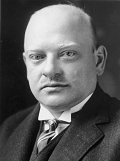Gustav Stresemann studied literature, philosophy, and political economy at Berlin and Leipzig. In 1903 he became a member of the National Liberal Party. In 1906 he was elected to the municipal council of Dresden (1906-1912). Stresemann served as a member of the Reichstag in 1907-1912 and 1914-1918. He supported the policy of Reich governments, especially colonial expansion and World War I. In 1917 he was elected chairman of the National Liberal Party. After the armistice of 11 Nov 1918, Stresemann formed the German People's Party (DVP). Elected to the National Constituent Assembly (Verfassunggebende Nationalversammlung), Stresemann was an opponent of the new German constitution and the Treaty of Versailles. Though he remained a monarchist and an opponent of the Weimar Republic, Stresemann was elected to the new Reichstag (1920-1929). On 13 Aug 1923 Stresemann was appointed Reich Chancellor of the "Great Coalition" government, composed of representatives of the Social Democrats, the Center, the Democrats, and the People's Party. He also assumed the duties of acting foreign minister. In September 1923 Stresemann declared an end to the "passive resistance" policy, initiated by his predecessor, Wilhelm Cuno, but the Social Democrats refused to support Stresemann's policy and left the coalition. The government resigned on 3 Oct 1923, and Reich President Friedrich Ebert again commissioned Stresemann to form his second government. During his second administration, Stresemann faced an attempt to proclaim the Rhineland Republic in Aachen (25 Oct 1923) and the putsch of Adolf Hitler (8-9 Nov 1923) in Munich. The government of Stresemann did not survive a vote of no confidence in the Reichstag on 23 Nov 1923 over the treatment of issues in Bavaria and Saxony. Stresemann was appointed foreign minister (30 Nov 1923 - 3 Oct 1929) in the cabinet of Wilhelm Marx and retained this post in subsequent governments. He secured the acceptance of the Dawes Plan (1924), which restructured reparations on the basis of Germany's ability to pay, and signed the Pact of Locarno (1925). On 8 Sep 1926 Germany was admitted into the League of Nations. Despite his health, which declined rapidly in early 1928, Stresemann retained his position as foreign minister; served as President of the Council of the League of Nations (7 Mar 1927 - 1 Sep 1927); In 1929 at The Hague, he accepted the Young Plan which named 30 Jun 1930, as the final date for the evacuation of the Ruhr. After suffering two strokes, Stresemann died on 3 Oct 1929. |
| Biographical sources: "Gustav Stresemann - Vermächtnis" (Berlin: Verlag Ullstein, 1932), 3 vols.;
Akten der Reichskanzlei: Weimarer Republik. Die Kabinette Stresemann I und II, 13. August bis 6. Oktober 1923, 6. Oktober bis 30. November 1923. Band I und II (Boppard am Rhein: Harald Boldt Verlag, 1978). |

